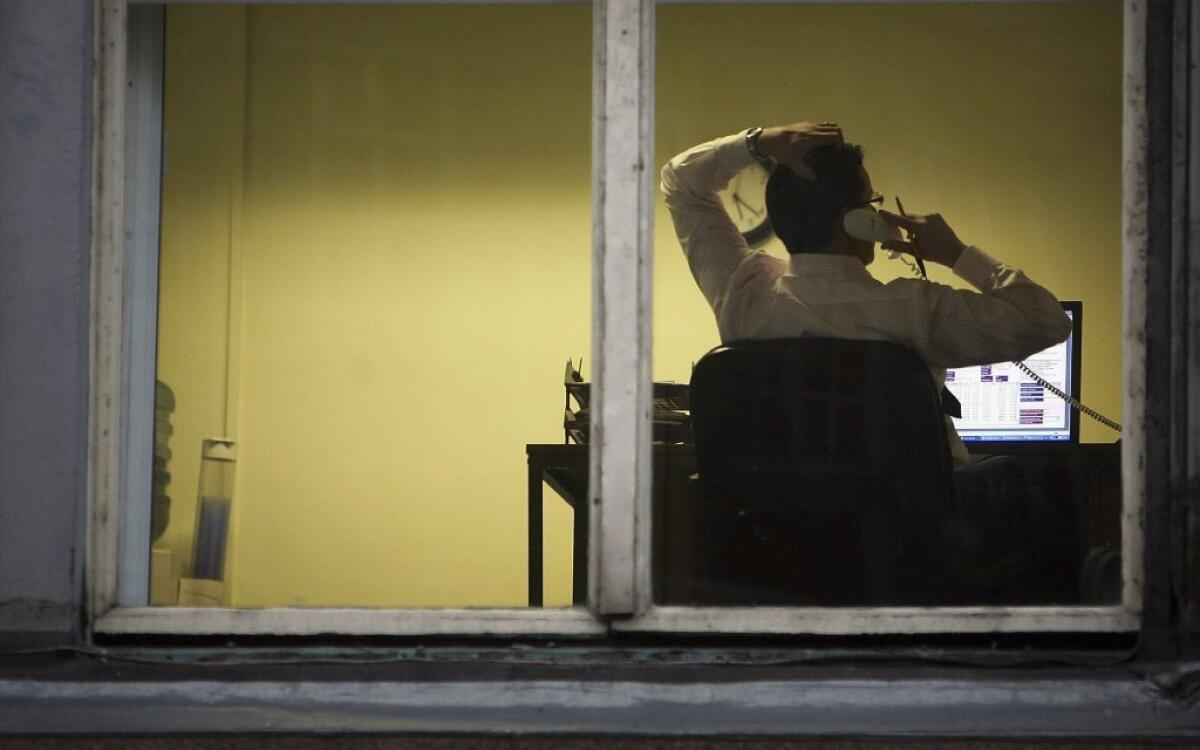Scientists suggest a way to lower your stroke risk: Shorten your workweek

A study finds that people who logged at least 55 hours per week were one-third more likely to suffer a stroke than their counterparts who put in only 35 to 40 hours per week.
Do you worry that your workaholic ways are killing you? A new study says you may be right.
In an analysis of more than half a million men and women from around the world, those who put in long hours at the office were 33% more likely to suffer a stroke than their colleagues who clocked out earlier. Even those who worked just over 40 hours per week saw a significant increase in stroke risk, according to results published online Wednesday in the journal Lancet.
An international team of researchers gathered data on hundreds of thousands of workers in the U.S., Australia, Israel and eight countries in Europe who participated in various long-term studies. The volunteers told researchers how many hours they worked per week. Then they were tracked for several years.
The researchers identified 528,908 people who were stroke-free when they joined a study. Over the next seven or so years, 1,722 of them suffered a stroke. But the odds weren’t spread equally – the more they worked, the greater the risk.
Compared to people who worked 35 to 40 hours per week, those who logged 41 to 48 hours per week were 10% more likely to suffer a stroke, the researchers found. Workers who put in 49 to 54 hours per week were in greater peril – their stroke risk was 27% higher than for the baseline group. Worst off were those who worked at least 55 hours per week and saw their stroke risk jump by 33%.
This dose-response relationship between working hours and stroke risk was seen in both men and women, and in workers in all four regions studied, the researchers wrote. The results were adjusted to account for the age, gender and socioeconomic status of each study volunteer as well as factors like smoking history, alcohol consumption and body mass index.
The researchers also looked at 603,838 workers with no history of coronary heart disease and tracked them for an average of 8.5 years. During that time, 4,768 had a heart attack or another coronary event. Compared to those with a standard workweek, those who put in at least 55 hours were 13% more likely to have a heart-related health problem, according to the study.
The results don’t prove that bigger workloads were responsible for the increased risk of heart disease or stroke, but there are several reasons to think the extra hours were responsible, the researchers wrote. For starters, people who spend more time behind a desk have less time to be physically active. Even if they do make time for exercise, just sitting for long periods has been shown to increase one’s risk of cardiovascular disease, diabetes, cancer and early death.
The researchers also speculate that those who work long hours are more likely to unwind with a cocktail, and heavy drinking is a known risk factor for stroke. And the longer one is in the office, the more often they trigger their body’s stress response, which is believed to be a common cause of “sudden death from overwork,” the study authors wrote.
The results “provide the strongest indication of a causal association between long working hours and an aspect of cardiovascular disease – namely, stroke,” Dr. Urban Janlert, a senior professor of public health at Umea University in Sweden, wrote in an editorial that accompanies the study.
A one-third increase in stroke risk may not sound like much, but it goes a long way when you consider how many people work long hours, Janlert wrote.
Among the 36 nations that belong to the Organization for Economic Cooperation and Development, nearly 13% of workers put in at least 50 hours per week. Turkey had the greatest proportion of these workaholics (41% of the workforce), followed by Mexico (29%) and Japan (22%). In the United States, 11.3% of workers log at least 50 hours per week.
The good news about long work hours is that “it should be possible to change them,” Janlert wrote. Some jobs are inherently dangerous, he wrote, “but the length of a working day is a human decision.”
Follow me on Twitter @LATkarenkaplan and “like” Los Angeles Times Science & Health on Facebook.







